For the 2025 school year, there is 1 public middle school serving 571 students in ESD 159 School District. This district's average middle testing ranking is 2/10, which is in the bottom 50% of public middle schools in Illinois.
Public Middle School in ESD 159 School District have an average math proficiency score of 7% (versus the Illinois public middle school average of 24%), and reading proficiency score of 22% (versus the 29% statewide average).
Minority enrollment is 99% of the student body (majority Black), which is more than the Illinois public middle school average of 61% (majority Hispanic).
Overview
This School District
This State (IL)
# Schools
5 Schools
1,600 Schools
# Students
1,648 Students
621,275 Students
# Teachers
128 Teachers
47,956 Teachers
Student : Teacher Ratio
13:1
13:1
District Rank
ESD 159 School District, which is ranked within the bottom 50% of all 844 school districts in Illinois (based off of combined math and reading proficiency testing data) for the 2020-2021 school year.
Overall District Rank
#710 out of 852 school districts
(Bottom 50%)
(Bottom 50%)
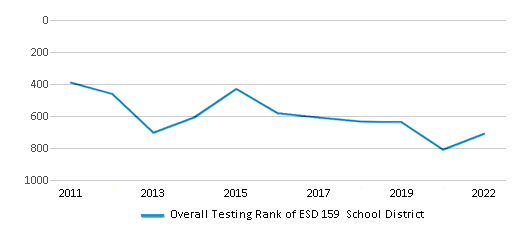
Math Test Scores (% Proficient)
(20-21)8%
28%
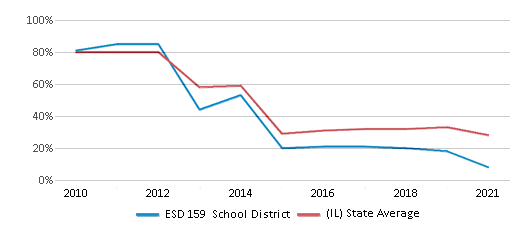
Reading/Language Arts Test Scores (% Proficient)
23%
30%
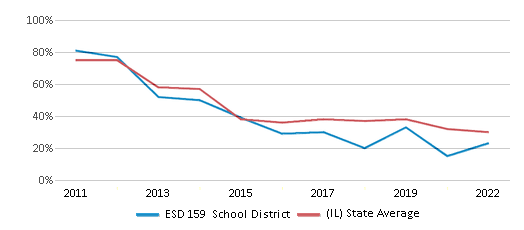
Science Test Scores (% Proficient)
41%
50%
Students by Ethnicity:
Diversity Score
0.33
0.71
# American Indian Students
2 Students
1,364 Students
% American Indian Students
n/a
n/a
# Asian Students
9 Students
32,125 Students
% Asian Students
n/a
5%
# Hispanic Students
208 Students
185,771 Students
% Hispanic Students
13%
30%
# Black Students
1,330 Students
133,271 Students
% Black Students
81%
22%
# White Students
27 Students
244,693 Students
% White Students
2%
39%
# Hawaiian Students
1 Student
608 Students
% Hawaiian Students
n/a
n/a
# Two or more races Students
71 Students
23,281 Students
% of Two or more races Students
4%
4%
Students by Grade:
# Students in PK Grade:
101
19,756
# Students in K Grade:
153
27,178
# Students in 1st Grade:
150
28,250
# Students in 2nd Grade:
150
29,179
# Students in 3rd Grade:
164
29,629
# Students in 4th Grade:
177
30,553
# Students in 5th Grade:
182
38,342
# Students in 6th Grade:
181
109,327
# Students in 7th Grade:
197
135,557
# Students in 8th Grade:
193
137,502
# Students in 9th Grade:
-
9,488
# Students in 10th Grade:
-
9,079
# Students in 11th Grade:
-
8,909
# Students in 12th Grade:
-
8,526
# Ungraded Students:
-
-
District Revenue and Spending
The revenue/student of $29,061 is higher than the state median of $21,990. The school district revenue/student has grown by 7% over four school years.
The school district's spending/student of $26,541 is higher than the state median of $21,244. The school district spending/student has grown by 7% over four school years.
Total Revenue
$48 MM
$41,381 MM
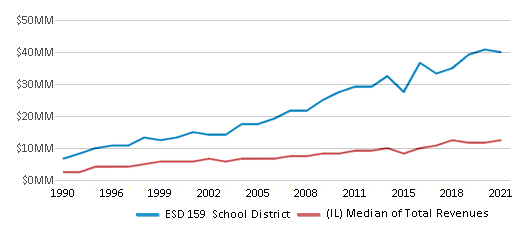
Spending
$44 MM
$39,976 MM
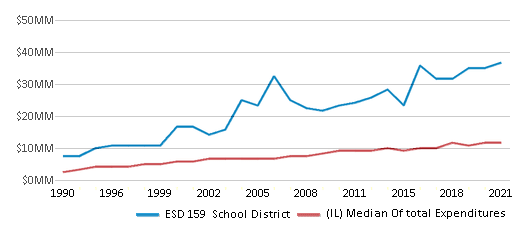
Revenue / Student
$29,061
$21,990
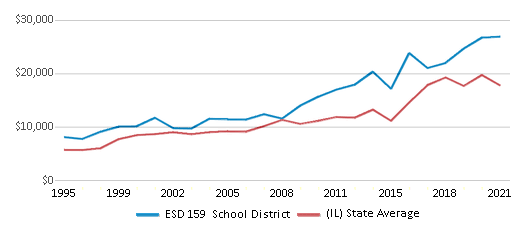
Spending / Student
$26,541
$21,244
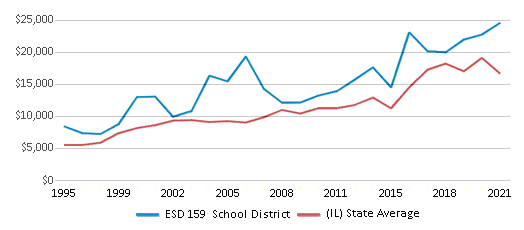
Best ESD 159 School District Public Middle Schools (2025)
School
(Math and Reading Proficiency)
(Math and Reading Proficiency)
Location
Grades
Students
Rank: #11.
Colin Powell Middle School
Rank:
3/
Bottom 50%10
20600 Matteson Ave
Matteson, IL 60443
(708) 283-9600
Matteson, IL 60443
(708) 283-9600
Grades: 6-8
| 571 students
Recent Articles

What Is A Charter School?
Explore the world of charter schools in this comprehensive guide. Learn about their history, how they operate, and the pros and cons of this educational innovation. Discover key facts about charter schools, including admission policies, demographics, and funding, as well as what to look for when considering a charter school for your child.

10 Reasons Why High School Sports Benefit Students
Discover the 10 compelling reasons why high school sports are beneficial for students. This comprehensive article explores how athletics enhance academic performance, foster personal growth, and develop crucial life skills. From improved fitness and time management to leadership development and community representation, learn why participating in high school sports can be a game-changer for students' overall success and well-being.

February 05, 2025
Understanding the U.S. Department of Education: Structure, Impact, and EvolutionWe explore how the Department of Education shapes American education, from its cabinet-level leadership to its impact on millions of students, written for general audiences seeking clarity on this vital institution.





